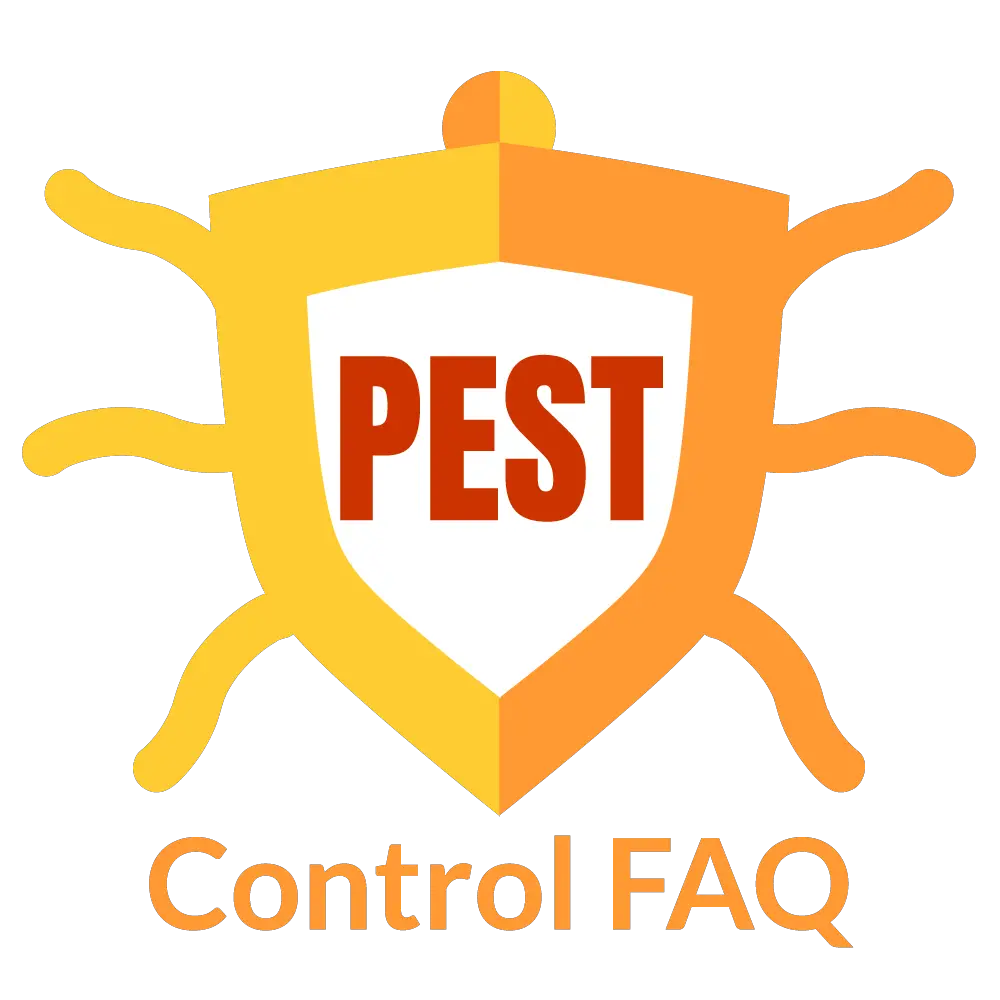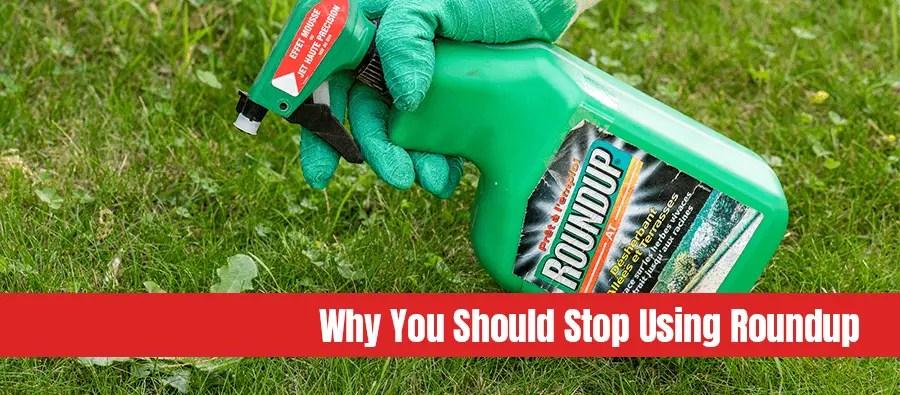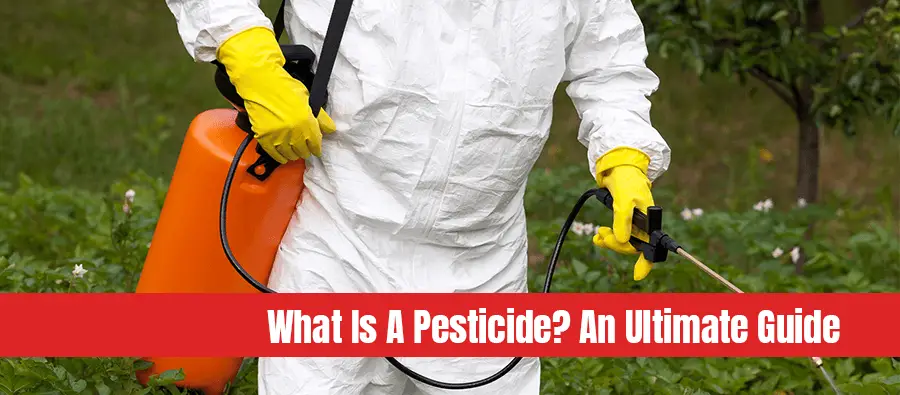If you own a garden, a farm, or just have a keen liking for plants, then you may have heard of the very potent herbicide, Roundup.
As its name suggests, this herbicide effectively rounds up unwanted weeds on your land and puts them on the sword. Earning a reputation as the best-selling herbicide in agricultural history.
All of that reputation came crashing down as quickly as it was built. Why did a product so revered become so hated and subsequently banned across the globe? This article highlights why Roundup is a bad choice.
What is Roundup and what is it made up of?
In 1975, researchers from Monsanto, an American specialist in fertilizers and other agricultural seeds, invented glyphosate. The active substance in Roundup.
It is currently the best-selling pesticide in the world, with more than 800,000 tons released each year. This herbicide also allows farmers to easily and massively treat their plots to maximize production.
Roundup has the peculiarity of being able to be used in a wide variety of situations, on all types of plants. It is also said to be systemic, which means it acts on the whole plant.
This is why it is used in arboriculture or viticulture as well as for the maintenance of urban and industrial spaces.
After the massive use of Roundup in the 1990s, some herbs began to develop resistance to the herbicide, causing farmers to use more and more products or to turn to GMOs (Genetically Modified Organisms)
In the United States, Roundup is often used on GMO crops specially designed to resist it, such as corn or “Roundup Ready” soybeans, also marketed by Monsanto.
The formulation of Roundup entered the public domain in 2000, so Monsanto is no longer the only one selling glyphosate-based herbicides.
How does Roundup work?
It’s very simple. Roundup promotes pathogenic germs (which cause disease) and blocks the growth of the plant as well as its defense. This causes the plant’s death.
The first problem with this method is: Glyphosate favors certain fungi such as fusarium, which in turn damages all crops. In the United States, the epidemics of Fusarium, and the associated diseases, have become increasingly prevalent.
The application of Roundup, therefore, kills any plants that have not been genetically modified. But is that all?
No, there is yet another problem: gradually, plants resistant to the herbicide were naturally selected and appeared in form of “weeds” that we cannot kill. An additional problem that farmers cannot contain.
In addition to glyphosate, the active ingredient, Roundup adds adjuvants that increase the toxic effects of glyphosate. These chemicals work by penetrating the cells of the target plants.
Among many others, these natural problems as a result of glyphosate demonstrate that Roundup cannot constitute a suitable solution to sustainable and ecological agriculture.
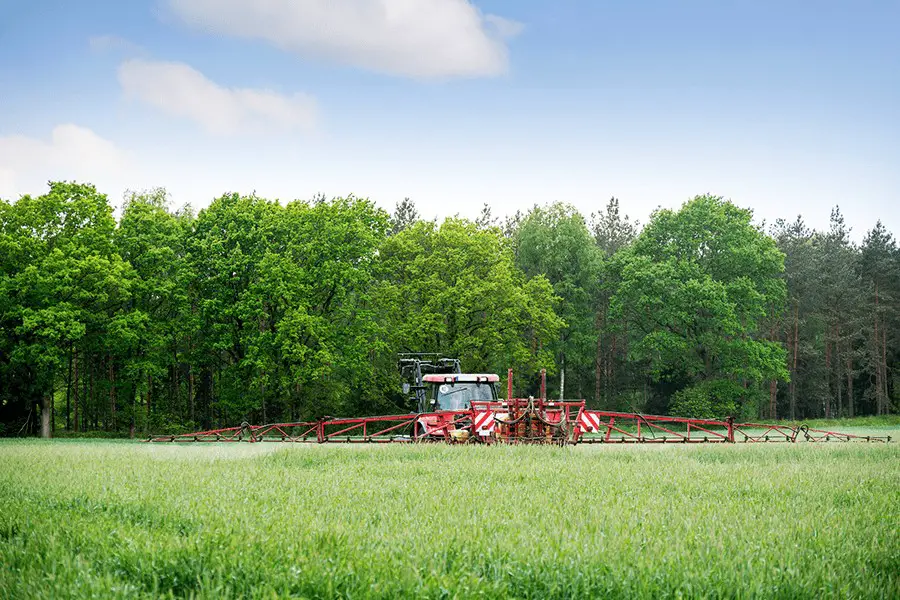
Has Roundup been banned?
In the US, Roundup has not been outright banned but its use is prohibited or restricted in some states. This has not stopped people from taking action in every state to start petitions to get the product banned. Check out where it’s prohibited here.
Glyphosate, the primary ingredient in Roundup, has been granted marketing authorization in the European Union until 2022.
A group of four countries (France, Hungary, the Netherlands, and Sweden) were commissioned to reassess the risks associated with the herbicide and published an opinion in June 2021.
Why should you stop using Roundup?
Roundup is a non-selective herbicide spray. This explains why traces of it are found near treated areas, in the air, in water, or in food. The wind can easily carry this product to any area near where you are applying it.
Cancer
According to the International Cancer Research Center, it could be the cause of blood cancers.
In March 2015, the WHO classified glyphosate as a probable carcinogen, while several studies have shown that glyphosate is an endocrine disruptor.
Two American researchers also discovered that “glyphosate is the most important factor in gluten intolerance”, which affects 18 million Americans. These studies were naturally denied by Monsanto and its lobbies.
Despite many regions still showing a reluctance to ban Roundup, an extensive American study published in the Journal of the National Cancer Institute has shed more light on the product.
This prospective study, called the Agricultural Health Study, began in the 1990s and followed a cohort of 54,251 farmers and spreaders from Iowa and North Carolina (United States).
- About 83% of them (44,932 people) used glyphosate.
- The result showed that 5,779 cancer cases were detected over the study period.
The research was funded by American institutions such as the National Cancer Institute, and not by industrialists.
Non-Hodgkin’s lymphoma
Non-Hodgkin’s lymphoma is cancer that develops from certain white blood cells, the lymphocytes. This lymphoma often starts in lymph nodes.
A study published in Mutation Research has shown that the link between glyphosate and non-Hodgkin’s lymphoma is stronger than had been previously announced.
Looking at data from people most exposed to Roundup, the authors found that exposure to glyphosate increases the risk of this cancer by 41%.
The authors also point to an agricultural practice that has increased the consumption of Roundup: green burn down. Which consists of using glyphosate before harvest to accelerate the death of the plant. This in turn increases the amount of glyphosate residue.
Acute myeloid leukemia
Acute myeloid leukemia is cancer of the bone marrow linked to the abnormal growth of precursor cells to white blood cells.
Further research has uncovered that those who used the most Roundup over twenty years had a 2.4 times higher risk of acute myeloid leukemia, compared to those who had not used glyphosate.
Parkinson’s disease
In 2013, a collective NCBI survey also highlighted a link between occupational exposure to pesticides and Parkinson’s disease. Particularly those with a similar composition to Roundup.
Water contamination
In addition to the risk to human health, the contamination of water by Roundup also raises questions about the impact on wildlife. Studies have indeed shown the toxicity of glyphosate on the behavior and development of fish.
Glyphosate is not biodegradable and persists in the environment. This was shown when Monsanto’s Roundup advertisement once implied that the product was biodegradable, and they were issued a false advertisement conviction.
What to use instead of Roundup?
If you are suffering from a weed invasion, the best, most effective, and most environmental method to get rid of these unwanted guests are natural herbicides.
A natural herbicide is a product that does not have glyphosate as its active ingredient. It helps control weeds that invade ornamental gardens, paved spaces, yards, walkways, or terraces while helping to better protect crops.
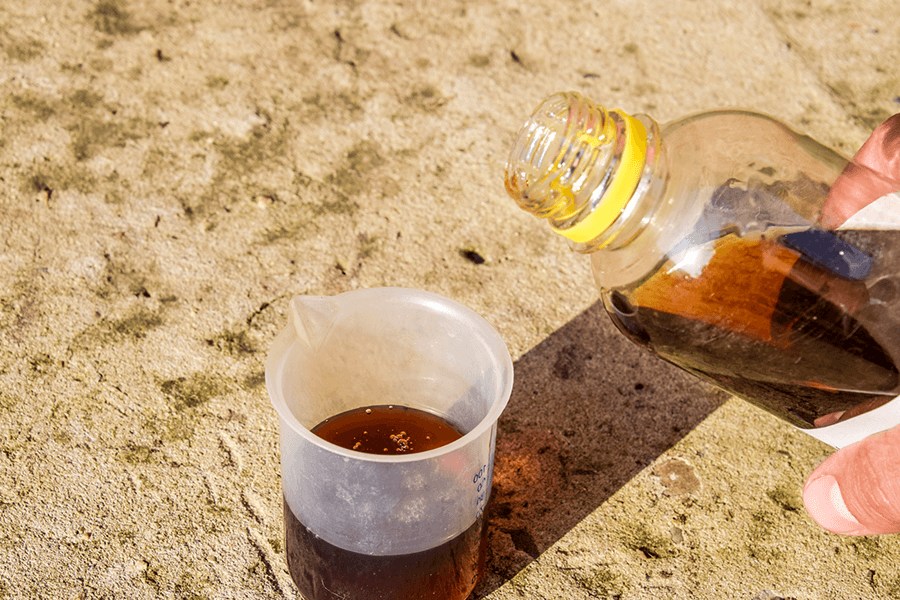
How do natural herbicides work?
Natural herbicides are intended to eliminate the weeds which suffocate your plants by depriving them of nutrients and light.
Certain products have a total action and eliminate all the plants present on a plot, without distinction.
They can also be selective to eliminate only harmful species. The action of natural herbicides on the soil can be more or less drawn out. Depending on the possible replanting, which must be carried out on a treated plot.
This product can have an impact on pets, with a variable degree of dangerousness. It is important to read the instructions for the herbicide you are using.
Even though they are natural, these herbicides are not trivial products.
What types of natural herbicides are there?
There are many different kinds of natural herbicides. Some still have chemicals, some are completely natural and some are DIY solutions!
The selective herbicide
Selective natural herbicides eliminate weeds without affecting the plant’s flowers.
There are often specific herbicides that get rid of weeds while keeping a specific plant alive. For example, grass herbicides kill any weed that is not grass.
The residual herbicide
This herbicide destroys the weeds present on the soil plot thanks to a prolonged action that prevents any regrowth.
After its use, it is not possible to replant plants. It is the best product when you want to weed a patio, yard, or driveway over the long term.
The non-residual herbicide
The non-residual herbicide is effective immediately and destroys the weeds present on a plot, but it has no residual action. This means it is possible to replant plants after using this natural herbicide between one and three days after use
Apart from chemical herbicides, there are two kinds of alternatives to natural herbicides, which we will present to you at the end of this article.
Best natural herbicides
Baking soda
Baking soda is recommended for organic farming and has very good results. It is an excellent herbicide for patios made up of slabs and cobblestones or gravel paths, but also along walls. It works ideally on small areas and is not suitable for treating large lawns or large beds.
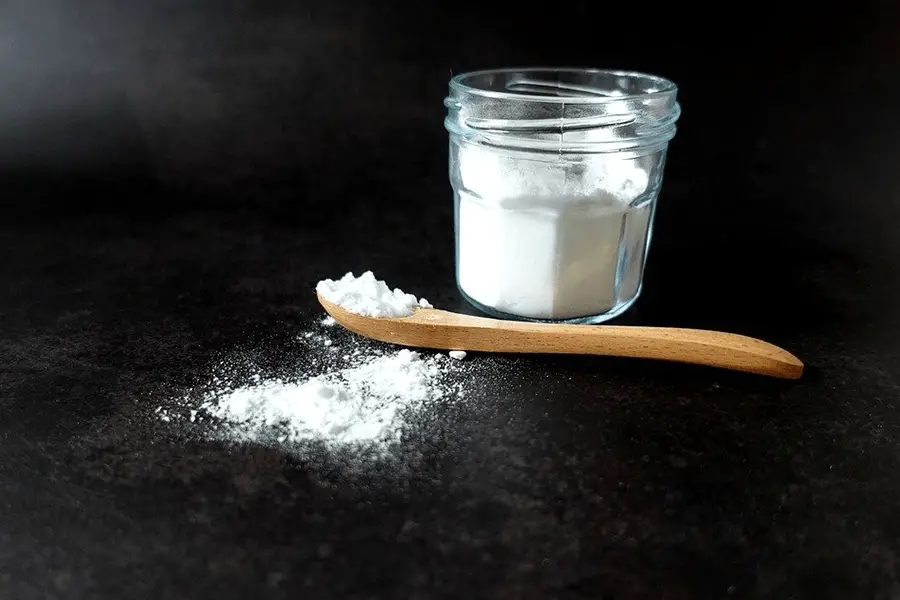
You can use baking soda to eliminate weeds by simply sprinkling it on the affected areas. Make sure the plants are thoroughly covered. It can be activated by rain, light watering, or dew. When moisture comes into contact with the granules of baking soda, it kills nettles, thistles, and other weeds. Be careful to not use too much liquid or you will completely wash away the powder. Only spritz to activate it. This works best when maintained at least once or twice a year.
It is safe for humans and pets, does not pollute groundwater, is fully biodegradable, and is harmless to flora and fauna.
Calyptus 45% Pure Super Concentrated Vinegar
Calyptus Concentrated Vinegar is 9x more potent than standard vinegar. It sanitizes, cleans, and removes rust, mold, or weeds from the garden.
It can be diluted with water to make 9 gallons, but it should not be mixed with other products like bleach. This vinegar effectively treats decks, walkways, and inside your home. It removes moss and burns plants – from the leaves to the root.
Made 100% from grains, this product is completely biodegradable and safe for the environment. It does not contain phosphates, sulfates, fluorine, chlorine, dyes, or other bleaching agents. In addition, it’s made in the USA.
It is also non-persistent and allows plants to be replanted after its use on a surface that has been treated.
Calyptus offers multiple versions of cleaning vinegar, including 20%, 30%, and 75%.
Doctor Kirchner Natural Weed & Grass Killer
Whether you’re looking to kill weeds in the garden, driveway, or sidewalk, Doctor Kirchner’s natural weed and grass killer is a go-to option. It works just as well as roundup but provides you with a natural fast-acting alternative that is not just eco-friendly but safer for humans and pets.
Doctor Kirchner’s natural weed and grass killer is made from natural ingredients and it doesn’t have an overpowering smell like many other weed killers. However, you may need to spray the grasses or weeds to the point of wetness for maximum results.
This chemical herbicide is not as fast as many other weed killers, it takes up to 12-24 hours to kill weeds and grasses. The grasses would wither and begin to turn brown after application.
Best chemical herbicides
Ortho GroundClear Weed & Grass Killer
Ortho Ground Clear is a non-selective spray that kills all types of weeds, mosses, and grasses. It works very quickly. You will observe the results in just 15 minutes.
Ortho Ground Clear is one of the highest-rated weed killers for good reasons. This weed killer becomes rainproof two hours after application, so you don’t have to worry much about a downpour.
It comes with a trigger wand that has a long handle, so you can easily target the weeds and avoid killing your plants. But you’ll still have to be extra careful as it is non-selective (it kills all types of plants). Ortho Ground Clear was also OMRI listed for organic gardening.
Spectracide Weed & Grass Killer
Spectracide Weed and Grass Killer are available in different sizes depending on your budget and need. This chemical herbicide can be used to control weeds and grasses around trees, flowerbeds, or driveways.
It kills off the weeds from the roots. You’ll see results in 3 hours. Apply this weed killer with a sprayer during warm, sunny weather for effective treatment. You should not use it on or too close to edible plants.
Another amazing feature of the Spectracide Weed and Grass Killer is that it becomes rainproof after just 15 minutes of application. As proof of the effectiveness and credibility of the spray, Spectracide Weed and Grass Killer offer a money-back guarantee.
Other alternatives to Roundup
First, there is manual labor, which consists of removing weeds with a garden tool like weeder, hoe, or rake: this is the best alternative for many. You will find diverse tools at any online or local shop.
